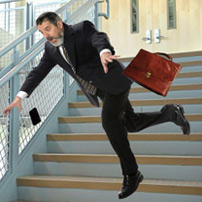Owner Versus Occupier
February 28, 2019 If you are walking down the street and the sign on a store falls on you, there are questions as to who would assume liability. The sign causes you to fall unconscious. You wake up in the emergency room and are told that the store has had trouble with signs before. Your medical bills, including an MRI for the concussion, tower over $5,000, and you miss three weeks of work. Later, you discover that there are two parties behind the store, consisting of the local operator and a corporation who owns it. Who should you file a lawsuit against?
If you are walking down the street and the sign on a store falls on you, there are questions as to who would assume liability. The sign causes you to fall unconscious. You wake up in the emergency room and are told that the store has had trouble with signs before. Your medical bills, including an MRI for the concussion, tower over $5,000, and you miss three weeks of work. Later, you discover that there are two parties behind the store, consisting of the local operator and a corporation who owns it. Who should you file a lawsuit against?
Under the law, it is possible to sue either one; the owner of the store or the operator. Determining liability requires establishing which party was in control of the property at the time of the sign collapse. In this case, the commercial tenant will likely be liable. However, there are numerous wrinkles to this ruling. If the operator of the store is an employee of the owning company, then the owners can be held liable. Control is almost always the deciding factor for who is liable for the injury.
Liability
Liability can belong to:
- Whoever is occupying the property with the intention of controlling it.
- Whoever was the last person to occupy abandoned property with intent to control it.
- If the previous two tests rule out, the liability extends to whoever is legally entitled to occupy the property.
If you control the property, you are responsible for injuries that occur. If the owner has not been able to rent the property out, they are still liable. There are circumstances under which the owner has liability, even when the property is rented out and the tenant is occupying it.
If the injury occurs in a multi-tenant building’s common area, such as the atrium, the owners are typically responsible for what happens in these areas. There is also the situation where the owner owns a property that is clearly unsafe. The tenant has no control over the condition. Therefore, the owner is liable for injuries. If the terms of the leasing contract specifically require that the tenant assume all responsibility for the property, liability shifts back to the tenant.
Franchisor versus Franchisee Situations
If you are walking under a sign and that falls on you from a franchised company, there may be exceptions if a third-party, such as the sign company, erected the sign in a dangerous manner. By the rules previously discussed, the franchisee or local operator of the building is liable for the accident. In any event, the franchisor would not normally be held liable for the injury. When the franchisor does not control the daily operations of an outlet, it may not be responsible for accidents occurring on the premises. However, each situation is unique, and a slip and fall lawyer can help with any questions and concerns pertaining to your case.
Philadelphia Slip and Fall Lawyers at Nerenberg Law Associates Advocate for Those Injured on Public Property
If you have been injured on someone else’s property, you may be due rightful compensation. Talk to the Philadelphia slip and fall lawyers at Nerenberg Law Associates today. We will hold the negligent party accountable for your injuries. Call us at 215-569-9100 or contact us online for a free consultation. Located in Philadelphia, we represent clients throughout New Jersey and Pennsylvania.








